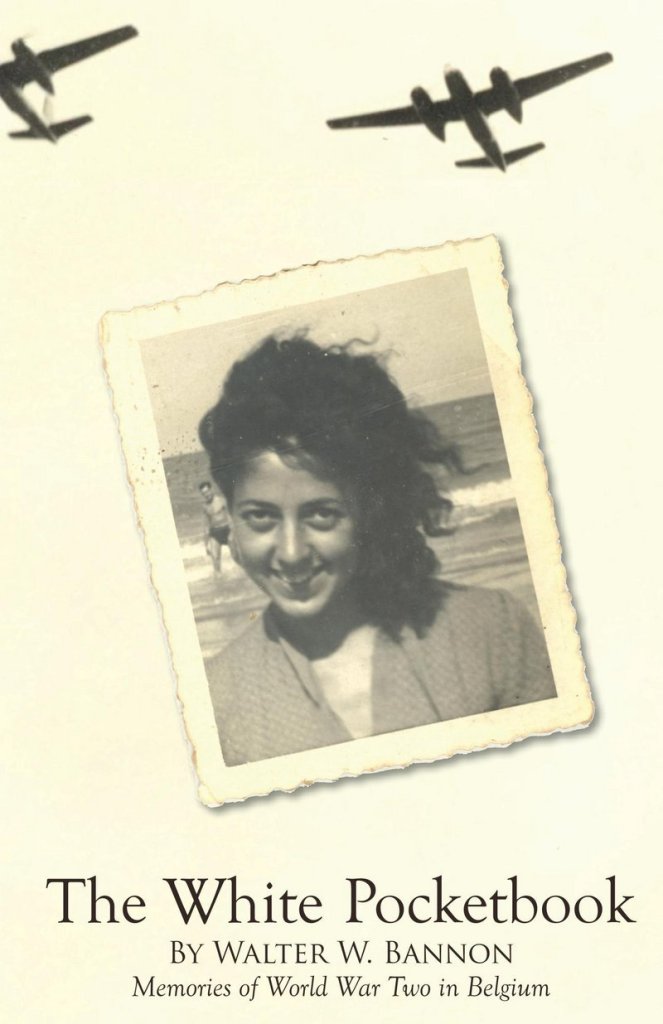When Walter W. Bannon’s son Danny got married on the Naples Causeway, Bannon’s mother, born Andree Laure Florin, came from Connecticut to attend. Days after the wedding, following a lunch in North Conway, N.H., Andree fell and broke several bones near her hip.
During Andree’s yearlong stay recuperating in Maine, Bannon spent time talking with her about her childhood growing up in Belgium’s French-speaking Wallonia, including World War II, when the region was occupied by Nazi Germany. His mother had seldom discussed those topics when Bannon, who lives in Bridgton, was growing up.
The Florin family villa was destroyed, and the family moved to a basement. Andree’s father was in the resistance, and Andree had run-ins and close escapes involving the Nazis.
When the fighting ended, an American soldier came to the Florin house to play their piano, and Andree ended up marrying him.
All of these tales are included in Bannon’s book “The White Pocketbook.” The 188-page, self-published paperback is available at Amazon, some local bookstores and at thewhitepocketbook.com. Bannon and his family have also recorded a song, also titled “The White Pocketbook,” that will be played at some of his readings.
Q: Even bad things can have good results. If your mother had not broken bones in her hip while visiting in Maine, you might never have written this book.
A: It really ended up as something good. We knew there was something going on in the war, but she never talked about it. We six children knew never to complain about the food, or she would say that she had to eat grass soup.
Now that I have reached the point of my life where I can take my mother very seriously, I thought, “This is my chance to get her story if she is willing to tell it.” She didn’t jump and say, “I would love to share the history of my life,” but she would talk for a little while and then stop. And we went through all of these boxes of hers, with pictures and unbelievable things, and I think it ended up being a very good thing for both of us.
Q: Being from Bouillon in the Walloon part of Belgium, she was considered a great-granddaughter of Duke Godfroi and was from a well-to-do family. When the German occupation started, it must have been especially rough on her and her family.
A: It was really hard. They did have money, a jewelry and tobacco business passed on to the family, a villa on the hill and a store in town, and they had money to send her to private school. She never learned to cook, so it was hard when she became an American wife, expected to cook. My father’s favorite meal was spaghetti and meatballs, and my mother thought the sauce was ketchup. If it was served for dinner, my father would be eating out of the house. He was in the military and always had good food there, but we six kids ate what she cooked.
Q: I find it amazing that the pocketbook she was given at age 10 survived all this time.
A: I have it right now. At the end of the book I say I will mail it back to her, but I haven’t done it yet. I have taken it to a number of signings, and people all want to pick it up.
She got it as a little girl, and their house was bombed, so it was lost for six years. She met an American soldier and was in Germany with him, and another gentlemen showed up. He had found the pocketbook and her name was on the papers, and she had put all sorts of papers and other things in that.
When we were going through the boxes she had and came across the pocketbook, I suggested we throw it away, and she became really upset. Then some more of the story came out.
When I was working on this book, I spoke to a woman who is a writer about it, and I said I was thinking of calling it “The Three Men I Hate,” and she said no, that women will never buy it. But then I thought that the story begins with the white pocketbook and ends with it, and that should be the title.
Q: Tell me about the three men she hates.
A: One was Hitler. I asked her if she could ever forgive him, and she said maybe someday, but not yet. Then there was Leon Degrelle, who was from her hometown, became a Nazi, brought the wrath of the Nazis on Bouillon and was made a general by Hitler. He was a friend of her family before the war. Hitler told him, “If I ever had a son, I would want him to be like you.”
The third one was Sen. Joe McCarthy. While our family was moving from one military post to another in 1954, because she had come from overseas, was French and had shifty eyes, they thought she might be a Communist and at one point, she was separated from her husband and children and put in a cell for four days. There was even talk of her being sent back to Europe. After four years of living in a basement and surviving the war, she came to America and was put in a prison. Even someone as giving and forgiving as her could not forgive that.
Q: Your mother went with her father to rescue a downed pilot — and she has a picture of her on the plane. She was too young to be a resistance fighter, but was connected with them, wasn’t she?
A: She never told us about that. I saw the picture and had to ask her about it, and she told me the pilot had crash-landed not far from her house, and they found the pilot, and got him very quickly back to town and then back home to England.
Q: The idea that they were taking 16-year-old girls from their homes and sending them off to serve the soldiers is horrible. But since her father was in the resistance and found out that was happening, he sent Andree to France to escape this.
A: He was connected and able to move her over to France, where she stayed for a month or two. When things settled down and they stopped taking the girls, he brought her back.
At the end of the war, community members wanted to kill some of those girls for sleeping with the German soldiers, and her father had a big part in preventing that.
Q: I found it odd that Andree agreed to marry an American who came in to play her family’s piano, and that he would return in three years to marry her after meeting her for just one day.
A: There were close to 1 million women who ended up marrying American and English soldiers. But every one of the soldiers who walked down the street was a hero.
And my father was like that. Whenever he saw a piano, he would want to play it, and he spoke a little French. And he could play the piano, but not like my mother, who was taught by nuns.
She says that she never even talked to him that day, but that when he left, he told her father that he was going to return in three years and marry his daughter. And I think her father was excited about Andree marrying an American hero, and when he received a letter a while later with a formal proposal, they agreed to it.
Q: Do think that there is a lesson here that people should record family memories when they have a chance — even if they don’t want to write it for public consumption?
A: I do think so, whether it’s just writing the account for themselves. When I talk at high schools, people are really interested in this. People are floored, and they end up in tears. People should really save these stories.
Tom Atwell is a freelance writer living in Cape Elizabeth. He can be contacted at 767-2297 or at:
tomatwell@me.com
Send questions/comments to the editors.




Success. Please wait for the page to reload. If the page does not reload within 5 seconds, please refresh the page.
Enter your email and password to access comments.
Hi, to comment on stories you must . This profile is in addition to your subscription and website login.
Already have a commenting profile? .
Invalid username/password.
Please check your email to confirm and complete your registration.
Only subscribers are eligible to post comments. Please subscribe or login first for digital access. Here’s why.
Use the form below to reset your password. When you've submitted your account email, we will send an email with a reset code.